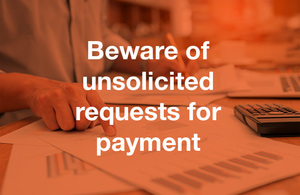IPO issues fresh warning to beware of misleading invoices
Customers should not pay these, and should always report them to the IPO.

-
Intellectual Property Office (IPO) issues fresh alert to beware of unsolicited payment requests
-
figures show a recent surge in such requests reported by customers – up 63% on same period last year
-
IPO publishes updated guidance and releases new images to help customers know what to look out for
-
customers should not pay these, and always report them to the IPO immediately
-
anyone who thinks they have been a victim of fraud should report this to the police
The IPO has issued a fresh warning to customers to beware of misleading requests for payments, sent by unsolicited organisations. These typically take the form of invoices requesting payment for trade marks, designs, or patents services.
Such ‘services’ – once paid for – may simply never be provided, or may be of little or no benefit to the customer (for example, inclusion on an ‘exclusive online register’, not recognised by the IPO or any other official body).
Alternatively, invoices may request payment at a highly inflated price for services available for a much lower fee – or free of charge – directly from the IPO.
The payment request will usually come from an organisation not recognised by the customer. They may also be accompanied by a copy of a fraudulently ‘signed’ agreement, in the hope that accounts departments will automatically approve payment of the invoice.
These organisations are not connected with the IPO or any other government body.
To help customers spot a misleading invoice, the IPO has released examples of misleading invoices received and reported by customers.
It has also published an updated list of names currently known to be used by such unsolicited organisations, as part of its updated guidance on avoiding misleading payment requests.
This comes as figures show a recent acceleration in the number of misleading payment requests reported to the IPO.
From April to June 2024, the IPO received 138 individual reports from customers, compared to 85 in the same three months last year – a jump of 63%. So far in 2024, the IPO has received a total of 169 individual reports, compared to 278 in all of 2023.
The IPO’s Head of Customer Experience, Caroline Rich, said:
Bad actors are becoming more creative and persistent in their efforts to target our customers with misleading payment requests. Once payment is made, there is little chance of getting your money back, as those involved often operate across international borders, making enforcement action difficult.
The recent examples we’re seeing can be very convincing at first glance, so it’s important to remain vigilant.
Our clear advice is to not pay such invoices, and always report them to the IPO. To help customers know what to look out for, we’ve released images of some recently reported to us. Customers with any doubt about a payment request should always get in touch with us, and anyone who believes they may have been a victim of fraud should report this to the police.
Temporary Assistant Commissioner Nik Adams, City of London Police said:
If you receive an email or invoice that you think might be a scam, don’t respond to it, click on any links, or send payment. If you think you have been a victim of fraud, report it to Report Fraud or by calling 0300 123 2040.
If you are in Scotland, I ask that you report fraud directly to Police Scotland by calling 101.
By reporting phishing scams and suspected fraud you are directly helping us in our work to identify and stop these criminals and helping us protect others from these scams.
Customers receiving a misleading invoice, or who may have concerns about any request for payment should, send a copy to misleadinginvoices@ipo.gov.uk - someone from the IPO will respond.
Customers can also report misleading invoices to Report Fraud and make an information report via their online reporting tool, and report to their local Trading Standards office.
Anyone who believes that they have been a victim of fraud should report this to the police via Report Fraud.
Notes to editors
It is common for unsolicited organisations to change their names. The names below are known to have been used by unsolicited organisations. Customers should send a copy of any request for payment that they have concerns about to misleadinginvoices@ipo.gov.uk – whether listed here or not.
- EIPA
- EUIP
- European Agency Intellectual Property
- European Intellectual Property Agency (EUIPA)
- European Intellectual Property Services (EIPS)
- European Patent and Trademark Agency (EPTA)
- European Union Intellectual Property Directory (EUIPD)
- Intellectual Property Organisation Service (IPOS)
- International Organisation Intellectual Property (IOIP)
- International Patent and Trademark Register (IPTMR)
- International Property Services (IPS)
- International Trademark Register
- INT-Trademarks
- IPRO
- IPR Protection
- TPS – Trademark Publication Service
- Trademarks Worldwide Ltd
- World Intellectual Property Office for Trademarks (WIPOT)
- World Organisation for Trademarks (WOTR)
- World Patent & Trademark Agency
- WTPR
It is a long-established statutory requirement for customers to provide their details as part of their application when registering or renewing an IP right. The details of an application are placed onto the public register, which by law is accessible from by any third party from any jurisdiction wishing to access this.
Misleading payment requests can be received for all types of IP, but are known predominantly to target trade mark customers.
The figures included relate to reports from customers of this type of request received by the IPO. They do not necessarily include requests that may have been reported elsewhere. The total number of requests received by customers may of course be significantly higher, including those not reported.
Updates to this page
-
Added translation
-
First published.